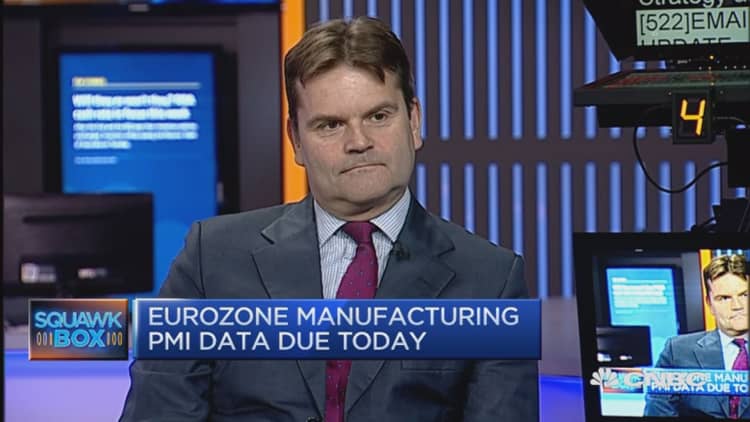
The U.S. government is sending a message to countries it believes are manipulating their currencies: We're watching you.
A Treasury report targets five countries in particular: China, Japan, Korea, Taiwan and Germany. Each meets at least two of the three criteria that "determine whether an economy may be pursuing foreign exchange policies that could give it an unfair competitive advantage against the United States."
At a time when currency devaluation has become a major tool used by multiple countries to stimulate growth, the U.S. is looking to protect its own interests. The report is an outgrowth of the Trade Facilitation and Trade Enforcement Act of 2015, a bipartisan effort aimed at stemming the global race to the bottom.
The criteria to determine whether a country should be on the "Monitoring List" of countries using unfair currency practices are: a trade surplus of larger than $20 billion, or 0.1 percent of U.S. GDP; a trade surplus with the U.S. that is more than 3 percent of that country's GDP; "persistent one-sided intervention," defined as purchases of foreign currency amounting to more than 2 percent of the country's GDP in a one-year period.
No country meets all three criteria, according to the report, though the five on the list meet at least two.
The act directs the president to engage each individual country on the list and tell it "to adopt appropriate policies to correct its undervaluation and external surpluses." If the countries in question do not act, the president can enact a variety of penalties, including cutting off the offending countries from Overseas Private Investment Corp. funding; asking the International Monetary Fund, which is charged with preventing currency manipulation, to step in; or reconsider whether the offending country should be engaged in trade agreements.
China came under harsh criticism when it devalued in August. The Treasury report notes China has "intervened heavily" in forex markets, and the issue has become political as well, with Republican presidential front-runner Donald Trump frequently bemoaning China's undercutting of the U.S. dollar.
To be sure, the U.S. could find itself in a tenuous position due to its own monetary practices.
Quantitative easing became popular on a global scale after the Federal Reserve enacted three rounds of QE that ballooned its balance sheet to $4.5 trillion. The , which measures the greenback against a basket of global currencies, declined as much as 18 percent peak-to-trough during the easing program, and has gained about 16 percent since the third round ended in October 2014.
The dollar's 10-year journey
The declining dollar was seen as a boost to multinational companies, while the post-QE strength has seen corporate earnings tumble and on track to decline about 7.6 percent in the first quarter, according to FactSet.
Treasury authorities see the dollar as a target from other countries whose growth has not matched that of the U.S.
"Concern that growth is decelerating in emerging markets has resulted in large capital outflows from these economies and downward pressure on their currencies," the report said. "The relative strength of the U.S. economy has pushed the dollar stronger against many currencies and on a trade-weighted basis over the past year and a half."
The report called on countries to implement more organic growth policies instead of simply seeking currency devaluation.
"More policy action is needed globally to strengthen demand," the report said. "Monetary policy responses have been forceful in general, but they need to be supported with additional fiscal actions to deliver a stronger boost to domestic demand."







